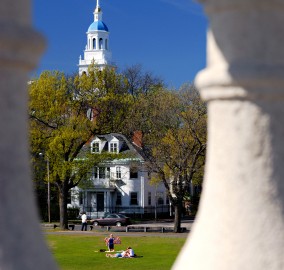Harvard Social Clubs May Lose Right of Association
For many students, membership in a fraternity or sorority is a key element of their college experience. Their social lives as undergraduates are centered on their association with fellow club members. They form intense friendships and social connections that last a lifetime.
Harvard is no exception, with “finals clubs” added to fraternities and sororities as organizations through which students can congregate with like-minded peers in a convivial atmosphere that helps them cope with the stress of academics. These clubs are far from perfect, with many colleges, including Harvard, having chosen to remove them from campus due to concern over discrimination, the occasional boorish behavior of a minority of club members, and the potential legal ramifications of both. But for the most part, Greek organizations and similar independent clubs are considered an integral part of campus (or off-campus) college life for students at Harvard and elsewhere.
Sororities, fraternities, and similar clubs don’t appeal to most students. The majority of students choose not to join one. Some students who seek to join one are rejected. However, the clubs, like any private organization, have always been considered free to choose who will be admitted as a member and who will not. Freedom of association is a civil right guaranteed by the First Amendment as an essential part of freedom of speech. So it would seem that, even if some students were offended by their rejection, those clubs at private institutions that operate off-campus and independently would retain the right to associate with only those whom they freely choose.
Not so, according to a Harvard faculty panel established to analyze undergraduate social clubs. Their key recommendation to the university is the assertion that it is not enough to expel these clubs from campus; they must be eliminated from college life completely or totally controlled by school authorities. The recommendation is justified in their report as follows:
“The Committee considered the importance of allowing our students to select their own social spaces and friends, but we also recognize principles such as inclusiveness and equality, which many members of the Harvard community consider of paramount importance to our mission.”
The panel urges Harvard to evaluate the training and procedures of independent social clubs to ensure that they are “optimal,” which means that they “follow the comprehensive set of guidelines.” As a result, the student clubs that would be authorized by Harvard to continue to operate are likely to be so burdened by rules that the purpose and function of a social club would be suffocated by compliance requirements. Basically…no fun allowed! It’s safe to say that Greek organizations would cease to exist.
Conor Friedersdorf, in a recent issue of The Atlantic magazine, commented about the panel’s recommendation facetiously, as follows:
“Concerns about the social organizations are understandable. For young people, a burdensome aptitude test is all but required to apply; only 5 percent of those who do so are admitted, under opaque, inconsistent standards; even as those lucky few celebrate, the rejects often report feeling excluded and marginalized; the exclusivity invariably perpetuates inequalities that last long after graduation; and those on the inside lose touch with the real world they will soon encounter.”
“Wait. I’m sorry. That was actually a general description of undergraduate admissions at Harvard, not its unrecognized fraternities, sororities, and final clubs. My mistake!”
Friedersdorf’s point, obviously, is that it’s hypocritical to demand absolute equality among Harvard students, even to the point of revoking freedom of association, when Harvard students are, in fact, an elite mix of highly accomplished meritocrats, legacies, and rare student/talent hybrids. Many come from privilege and to privilege they will return. Why deny them the benefit of free association during four years of college for the sake of faux-equality?
It remains to be seen what action the Harvard administration will take on the panel’s recommendation, nor is it clear if fellow Ivy League and other elite private institutions will follow suit. Whatever the outcome is, it will neither add nor detract from Harvard University’s centuries-old record of academic excellence. However, this issue may be worth following by any high school student who aspires to an education at a top-tier college and who also looks forward to participation in a sorority, fraternity, or similar self-selecting social organization.
IvySelect, a college admissions consulting firm, will guide you in determining your optimal strategic path, both in attaining acceptance at best–fit colleges and in accomplishing your educational goals. IvySelect specializes in students who aspire to attend Ivy League and other elite institutions. We provide expert guidance during all stages of the admissions process, especially in developing the best possible application for each of your targeted institutions.





